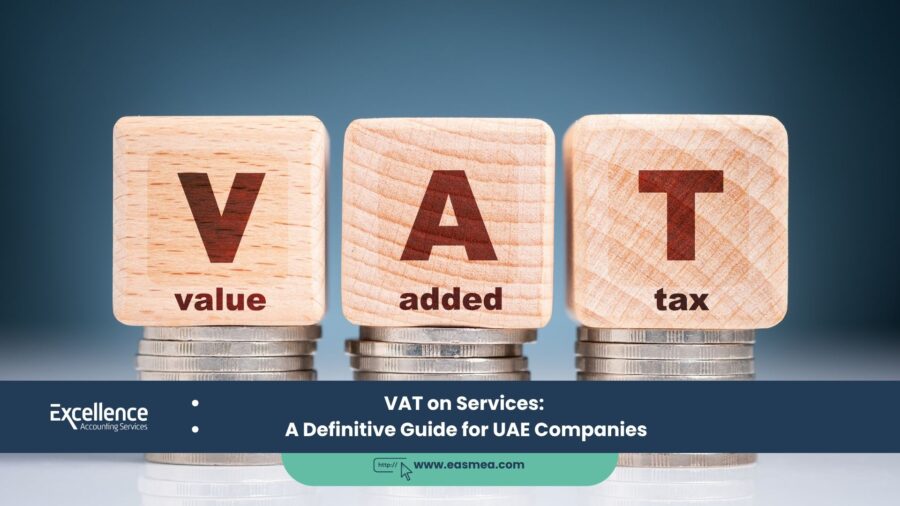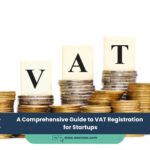VAT on Services: A Definitive Guide for UAE Companies
Since the introduction of Value Added Tax, businesses in the UAE have navigated a new layer of financial complexity. While applying VAT to the sale of tangible goods is relatively straightforward, the world of services presents a far more intricate challenge. Unlike a physical product, a service is intangible, its delivery can cross borders in an instant, and its value can be subjective. This inherent complexity makes a deep understanding of VAT on services not just beneficial, but absolutely essential for compliance and financial health.
- VAT on Services: A Definitive Guide for UAE Companies
- Part 1: The Foundation - Defining 'Services' and 'Place of Supply'
- Part 2: A Deep Dive into Place of Supply Scenarios
- Part 3: Navigating Specific Service Sectors
- Part 4: The Reverse Charge Mechanism (RCM) in Action
- What Excellence Accounting Services (EAS) Can Offer
- Frequently Asked Questions (FAQs)
- Navigate VAT on Services with Confidence.
For service-based companies—from consultants and software providers to financial advisors and marketing agencies—correctly applying VAT hinges on one critical concept: the “place of supply.” Misinterpreting these rules can lead to significant errors, such as incorrectly charging VAT to an international client or failing to account for it on an imported service. This definitive guide is designed to demystify the VAT treatment of services in the UAE. We will break down the core principles, explore the all-important place of supply rules, examine specific industry applications, and clarify the mechanics of cross-border transactions, providing a robust framework for every service-oriented business in the UAE.
Key Takeaways for VAT on Services
- Place of Supply is Everything: This set of rules determines whether a service falls under the scope of UAE VAT. The default location is the supplier’s, but numerous critical exceptions apply.
- Cross-Border Complexity: Services provided to clients outside the UAE are often zero-rated, while services imported from foreign suppliers typically require the Reverse Charge Mechanism (RCM).
- Not All Services are Standard-Rated: Key sectors like finance, real estate, healthcare, and education have specific VAT treatments, including exemptions and zero-rating, which must be applied correctly.
- Documentation is Your Proof: Contracts, service agreements, and detailed tax invoices are crucial for justifying the VAT treatment you apply, especially for exported services.
- Technology is a Critical Enabler: Using a robust accounting system is vital for correctly tracking, invoicing, and reporting the VAT on diverse service transactions.
Part 1: The Foundation – Defining ‘Services’ and ‘Place of Supply’
To build a compliant VAT framework, we must first understand the fundamental legal concepts that govern the taxation of services.
What Constitutes a “Service” for VAT?
The UAE VAT law provides a very broad definition of a service: it is anything that can be supplied other than a good. This catch-all definition encompasses a vast range of economic activities, including professional advice, digital products, transportation, intellectual property rights, and construction work. If it’s not a physical item, it’s almost certainly a service for VAT purposes.
The Golden Rule: Understanding Place of Supply
The concept of “place of supply” is the single most important factor in determining whether UAE VAT should be charged. It is the legal mechanism for identifying which country has the right to tax a transaction.
- The General Rule: For most services, the place of supply is the place of residence of the supplier. So, if your business is based in the UAE, the default position is that your services are supplied in the UAE and subject to 5% VAT.
- The Critical Exceptions: The law outlines numerous “special rules” that override this general principle. It is in these exceptions that most of the complexity lies. Forgetting these special rules can lead to major compliance failures. For instance, the place of supply for services related to real estate is where the property is located, not where the supplier is.
Part 2: A Deep Dive into Place of Supply Scenarios
Let’s break down how the place of supply rules work in common business-to-business (B2B) and business-to-consumer (B2C) scenarios.
| Scenario | Supplier Location | Customer Location | Place of Supply | VAT Treatment |
|---|---|---|---|---|
| Local B2B/B2C | UAE | UAE | UAE | 5% Standard Rate |
| Export of Services (B2B) | UAE | Outside UAE | Outside UAE | 0% Zero-Rated (if specific conditions are met) |
| Export of Services (B2C) | UAE | Outside UAE | Outside UAE | Outside the Scope of UAE VAT |
| Import of Services | Outside UAE | UAE | UAE (Recipient’s location) | Subject to Reverse Charge Mechanism |
Critical Conditions for Zero-Rating Exported Services
To apply the 0% rate to a service supplied to a business outside the UAE, it’s not enough that the client is based abroad. You must also prove that the benefit of the service is not enjoyed within the UAE. This is a crucial distinction that requires robust documentation, like contracts and correspondence, to support your tax position.
Part 3: Navigating Specific Service Sectors
While the general rules provide a foundation, several key sectors have their own specific VAT treatments that must be understood.
Financial Services
This is a complex area with a mix of exempt and taxable supplies.
- Exempt: Margin-based products like loans, mortgages, and currency exchange are generally exempt from VAT.
- Standard-Rated (5%): Services provided for an explicit fee, commission, or discount (e.g., financial advisory fees, fund management fees, bank charges) are subject to 5% VAT. This complexity often requires expert VAT consultants in Dubai to navigate correctly.
Real Estate Services
The VAT treatment depends on the nature of the property and the service.
- Standard-Rated (5%): All services related to commercial property (leases, sales), as well as brokerage fees and property management services for any type of property, are subject to 5% VAT.
- Zero-Rated / Exempt: The supply of residential property itself has special rules, but services *around* it are typically standard-rated.
Electronic and Telecommunication Services
For these services, the place of supply is determined by where the service is “used and enjoyed.” This means that even if a UAE company provides a digital service, if the user is located outside the UAE, it would fall outside the scope. Conversely, when a UAE resident subscribes to a foreign streaming service, that service is “enjoyed” in the UAE and becomes subject to VAT via the Reverse Charge Mechanism.
Part 4: The Reverse Charge Mechanism (RCM) in Action
RCM is a fundamental concept for any UAE business that procures services from foreign suppliers. It shifts the responsibility for accounting for VAT from the overseas supplier to the UAE-based recipient.
How does it work?
Imagine your company pays AED 10,000 for a software license from a company in Ireland. The Irish company won’t charge you UAE VAT. Instead, you must:
- Calculate the Output Tax: You calculate 5% of the value (AED 500) and declare it in your VAT return as output tax, as if you had made the sale yourself.
- Claim the Input Tax: You then claim the same amount (AED 500) back as input tax in the same return (provided you are a fully taxable business).
While the net financial impact is often zero, failing to declare RCM transactions is a significant compliance breach. The process requires diligent accounting and bookkeeping to track all foreign service invoices.
The Power of a Modern Accounting System
Manually tracking RCM, different service types, and place of supply rules is fraught with risk. This is where a modern accounting platform becomes indispensable. A solution like Zoho Books is tailored for the UAE’s VAT environment. It can be configured to automatically handle RCM transactions, apply different tax rates to different service items, and generate accurate reports for your VAT return filing. A professional accounting system implementation ensures these rules are correctly set up from the start.
What Excellence Accounting Services (EAS) Can Offer
Navigating the nuances of VAT on services requires specialized expertise. At EAS, we provide clear, strategic, and comprehensive support to ensure your service-based business is fully compliant and tax-efficient.
- Specialized VAT Consultancy for Service Sectors: Our VAT consultants possess deep expertise in the specific rules affecting finance, real estate, technology, and professional services.
- Place of Supply Analysis: We conduct thorough reviews of your service offerings and contracts to determine the correct place of supply and VAT treatment for all your revenue streams.
- RCM and Cross-Border Transaction Management: We ensure you are correctly accounting for all imported services and zero-rating your exported services, protecting you from common compliance pitfalls.
- End-to-End Compliance: From initial VAT registration to meticulous VAT return filing, we manage your entire compliance journey.
- Strategic Financial Oversight: Our CFO services help integrate your VAT strategy into your broader business planning, optimizing cash flow and profitability.
- Audit Preparedness: Through our internal audit services, we proactively review your VAT processes to ensure you are always prepared for FTA scrutiny.
Frequently Asked Questions (FAQs)
This would be considered an export of services to a non-GCC recipient. Provided the UK client is a business and you have evidence to support this (e.g., a contract), the service is zero-rated (0% VAT). You must still report this on your VAT return as a zero-rated supply.
This is a classic example of an imported service. You must account for VAT under the Reverse Charge Mechanism (RCM). You will need to calculate 5% of the subscription fee, declare it as output tax, and simultaneously claim it back as input tax on your VAT return.
An electronically supplied service is one that is delivered over the internet or an electronic network, is heavily reliant on IT for its supply, and is largely automated. Examples include website hosting, software-as-a-service (SaaS), online gaming, and digital content downloads.
Yes. If the underlying service you provide is subject to 5% VAT, then any additional charges like delivery, shipping, or administrative fees that are part of that same supply are also subject to 5% VAT. They are considered part of the total price for your service.
Proving the location of a non-business customer can be challenging. The FTA accepts various forms of evidence, such as the customer’s IP address, their billing address, the country code of their SIM card, or their bank account details. It’s best practice to collect at least two non-conflicting pieces of evidence.
You cannot recover 100% of the input VAT on your general overheads like rent. You must use an approved input tax apportionment method to allocate the VAT between your taxable and exempt activities. You can only recover the portion of VAT that relates to your taxable consulting services.
Yes. Any mandatory service charge is considered part of the value of the supply of the food, beverage, or hotel stay. As these are standard-rated supplies, the service charge is also subject to 5% VAT. Discretionary tips, however, are not subject to VAT.
You need robust commercial evidence. This includes the contract with the foreign client, tax invoices that clearly state the service and the recipient’s location, proof of the client’s business status in their country, and correspondence that confirms the nature and scope of the service being provided abroad.
Yes. This is a taxable supply of services. Unless the Free Zone company is a Qualifying Free Zone Person and the service is a “Qualifying Activity” under Corporate Tax law, the transaction is treated like any other domestic supply. The mainland company must charge 5% VAT to the Free Zone subsidiary.
Yes. When a service is supplied from a Designated Zone (which is treated as outside the UAE for certain goods) to a recipient on the UAE mainland, it is considered an “import” of services. The mainland-based recipient must account for VAT under the Reverse Charge Mechanism.
Conclusion: From Complexity to Clarity
The rules governing VAT on services in the UAE are undeniably complex, but they are not insurmountable. By building a compliance strategy on a solid understanding of the place of supply rules, being diligent with documentation, and leveraging the right technology, service-based businesses can achieve clarity and confidence. Approaching VAT as a core strategic function, rather than just a compliance task, protects your business from risk and positions it for long-term, sustainable growth in the dynamic UAE economy.




